Introduction to Jewish Samarkand
Samarkand, a city located in Uzbekistan on the ancient Silk Road, has been home to Jewish people for centuries. Its rich and diverse history is deeply intertwined with its vibrant Jewish culture, which can still be seen today in its architecture, synagogues, mosques, mausoleums and monuments dedicated to famous figures from Samarkand’s past. This article will explore how Jews have shaped this city over time and what it means to experience modern-day Jewish life in Samarkand. It will also provide an overview of places of cultural and religious importance for those wishing to discover this unique part of Central Asia’s history as well as introduce some of the famous Jewish figures who lived or died there.
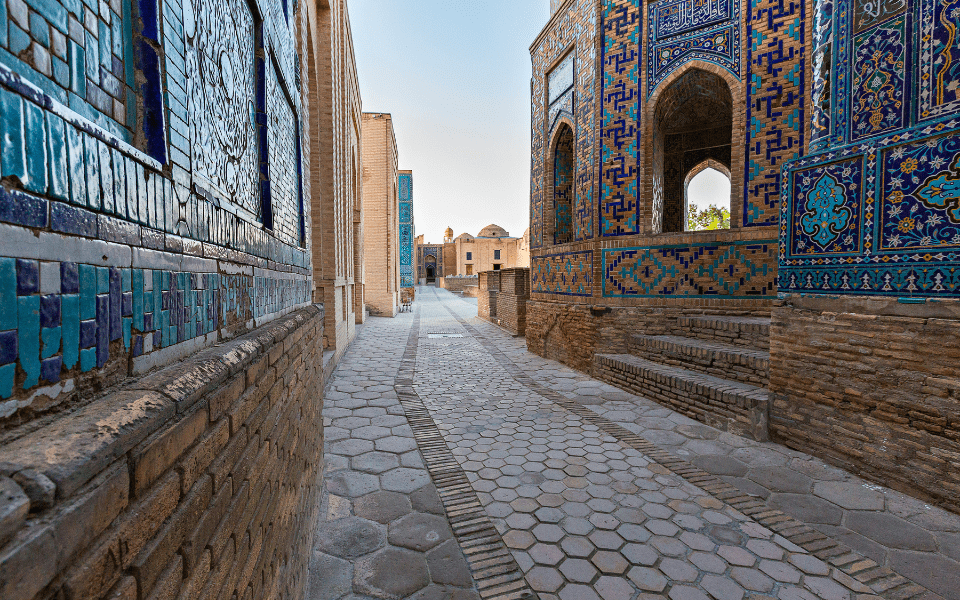
Jewish Culture and History in Samarkand
Early Jewish Life in Samarkand
When Timur-Leng, the Turco-Mongol conqueror who founded the Timurid Empire in and around modern-day Afghanistan, Iran, and Central Asia, made Samarkand the capital of his empire. He brought there many thousands of carpet weavers, silk dyers, artisans, and merchants from many cities he had conquered, and among them some Jews and Christians from Kurdistan and Northern Syria. In Samarkand, the Jewish deportees adopted the Eastern Persian idiom of the local Jewish (and Muslim) inhabitants. Those Jews, who shaped the character of the community, would much later be known as “Bukharan Jews.”
The term “Bukharan Jews” refers to the Central Asian Jews of the khanate of Bukhara, those of Samarkand, and the Ferghana Valley. Today, the region is divided between the former Soviet republics of Uzbekistan, Tajikistan, and Kyrgyzstan. The majority of Bukharan Jews live in the Uzbek cities of Samarkand, Bukhara, Tashkent, and Kokand, in Tajikistan’s capital, Dushanbe, and in Kyrgyzstan’s capital, Bishkek. Also, a large number of Bukharan Jews have made aliyah and have congregated in Jerusalem.
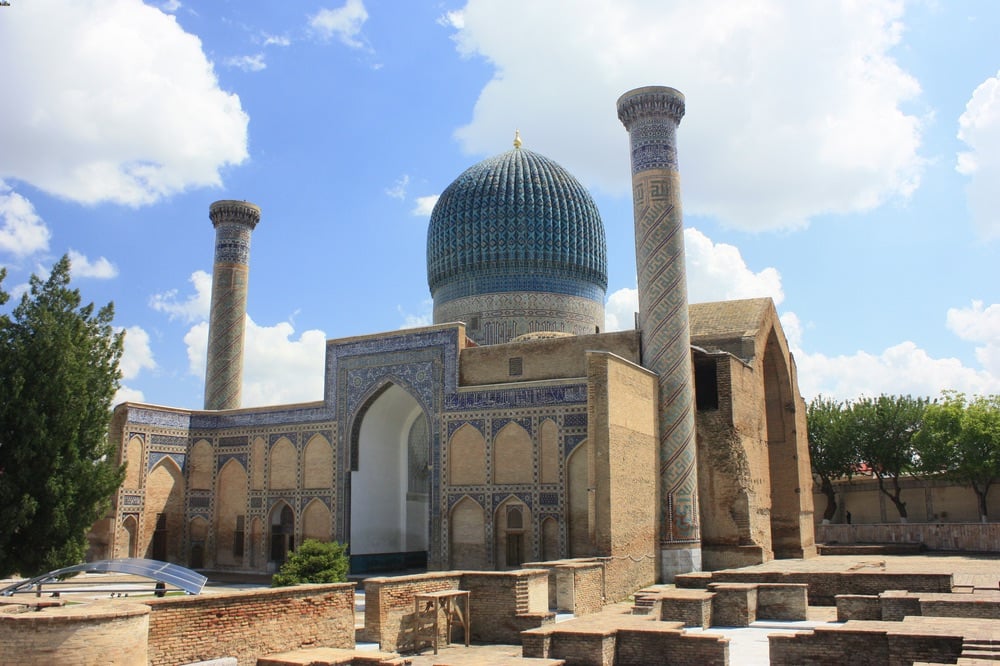
Nowadays, the Jews of Central Asia are either “Bukharan” because they are descendants of the former subjects of the Emir of Bukhara, or else they are Ashkenazi Jews who settled there in the Russian Imperial period beginning in the 1860s, with the addition of political deportees in the Soviet period and Polish refugees who were fleeing Hitler.
Recent Jewish Life in Samarkand
In territories under direct Russian rule, Jews enjoyed personal liberties and economic opportunities unheard of under the ancient régime. Jewish families made big fortunes on trade with Russia proper, India, Persia, and Western Europe. The growth of the community attracted immigrants from Meshhed (Muslim crypto-Jews) and Afghanistan, where in 1885, the government confiscated the property of 250 Jews and expelled them, with their families, to Termez, wherefrom they proceeded to Samarkand. It also attracted Baha’is from Persia, some of whom were former converts from Judaism.
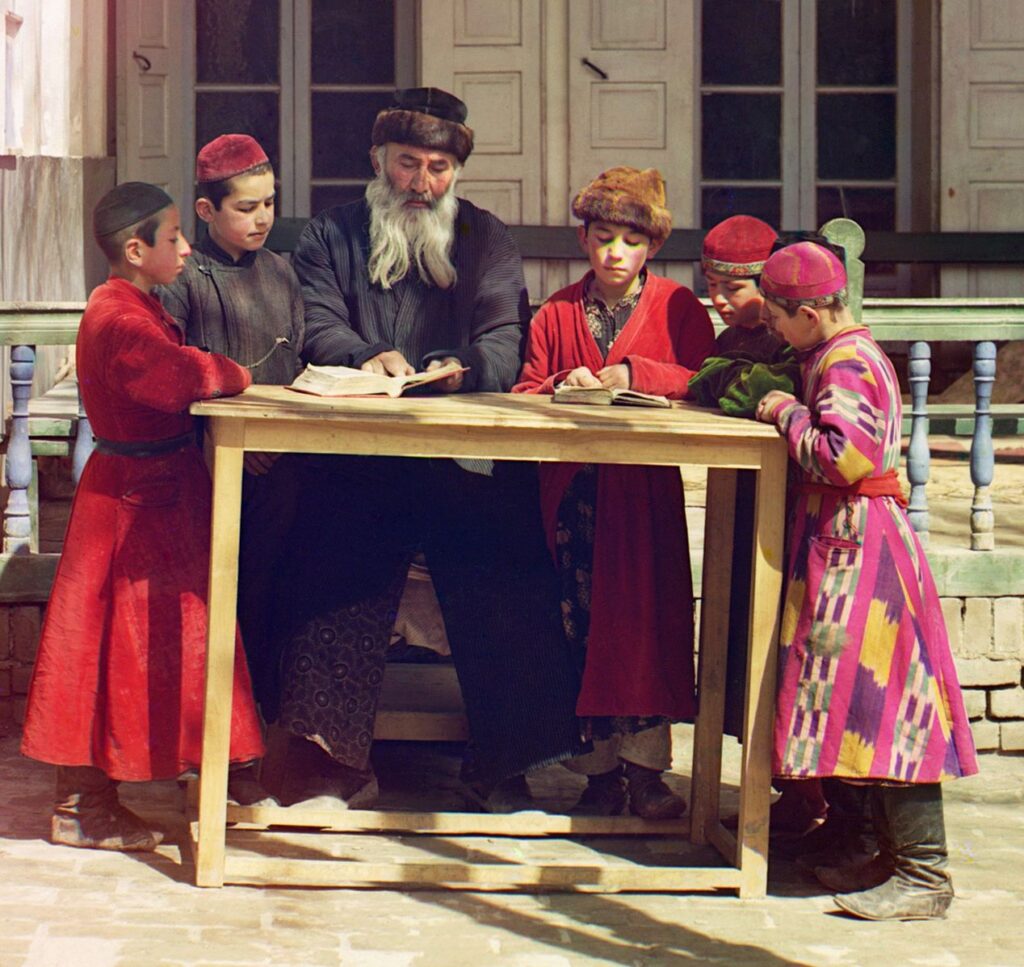
In 1889, the new wave of immigration from Samarkand to the Holy Land began, being thus the third “modern” wave of ‘aliyah in the 1880s. In 1891, a new neighborhood—Rehoboth, or Rehoboth ha-Bukharim—arose in Jerusalem, with some 500 persons participating in the project. The neighborhood would evolve into the famous Bukharan Quarter of New Jerusalem, a beautifully built area with “palaces” of rich merchant families.
Jews in Modern-Day Samarkand
Approximately 4,200 Jews remain in Uzbekistan, mainly in Bukhara, Samarkand and Tashkent, the major Jewish cultural centers. The Jewish Agency, Chabad and the Joint Distribution Committee are the most visible Jewish organizations in the country, providing Jewish education through schools and summer camps. The Jewish Agency sponsors a moadon (youth center) in several cities, including Tashkent, Samarkand, Bukhara and some smaller cities in the Fergana Valley, like Andijan.
In July 2001, more than 250 children attended the Jewish Agency’s summer seminar on the outskirts of the capital, Tashkent, a 10-day lesson on Israel and Judaism. The campers, ages 10-16, came from all over Uzbekistan (which is slightly larger than California). And while their knowledge of Jewish topics ranged widely, they all shared a Jewish identity, singing Hebrew songs, baking challah and drawing pictures of the Kotel. Some even spoke Hebrew, others kept kosher and rested on Shabbat.
Most Uzbek Jews today speak Russian. Historically, they spoke a Jewish dialect of Tajik which is still spoken in Bukhara and Samarkand. In addition, some speak English, Hebrew and Uzbek. Unfortunately, among adults, there is little mixing between Ashkenazim and Bukharim.
About 2,000 Jews live in Samarkand today and some of the top Jewish attractions include a synagogue, the old Jewish quarter, and a Jewish cemetery.
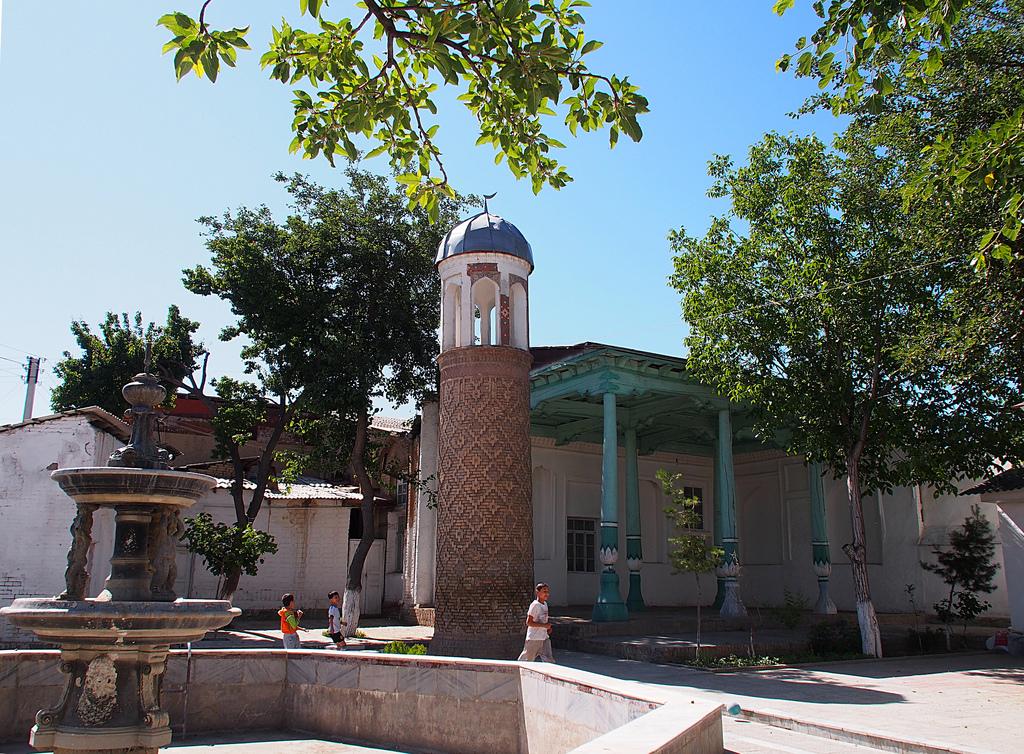
Iconic Attractions and Events in Samarkand
The Jewish Quarter
The Jewish Quarter of Samarkand is a vibrant and bustling area that has been home to the city’s Jewish population for centuries. Located in the heart of the city, it is full of synagogues, religious schools, and other places of worship that celebrate this unique cultural identity. The quarter also houses some of Samarkand’s most important monuments dedicated to famous figures from its past such as Alexander Sverdlin and Shimon Dubnov. Visitors will find an abundance of restaurants offering traditional Uzbek cuisine as well as shops selling handmade crafts by local artisans – all within easy reach from this historic neighborhood. It’s no wonder why so many people flock to experience what it means to discover a timeless legacy in Samarkand today!
The Gumbaz Synagogue
The Gumbaz Synagogue is the only Jewish landmark inside the city, and it dates back to the end of the nineteenth century, specifically to the year 1891. This Jewish landmark is characterized by being influenced by the Islamic architecture surrounding it, and added wonderful decorations and mosaics on its walls and domes, and made the merging of European and Islamic details of the building a matter. Very unique and an important tourist attraction. Visitors to the synagogue will also find pictures of former rabbis, Stars of David, carved doors, and much more. Learn more.
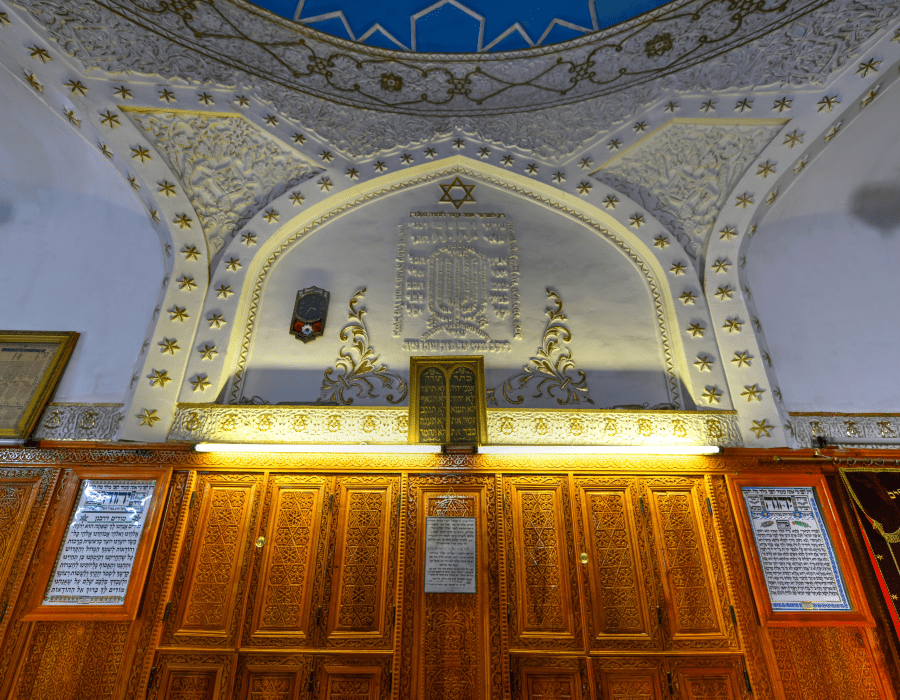
Gumbaz Synagogue in Samarkand, Uzbekistan | Demerzel21 via Canva
The Tomb of Daniel
The Tomb of Daniel reputedly holds the remains of the Old Testament prophet Daniel, revered by Muslims, Jews and Christians alike – although only Christians regard him as a prophet. As legend has it, Timur tried to conquer modern day Syria, but successively failed – apparently because the body of Daniel was preventing his success.
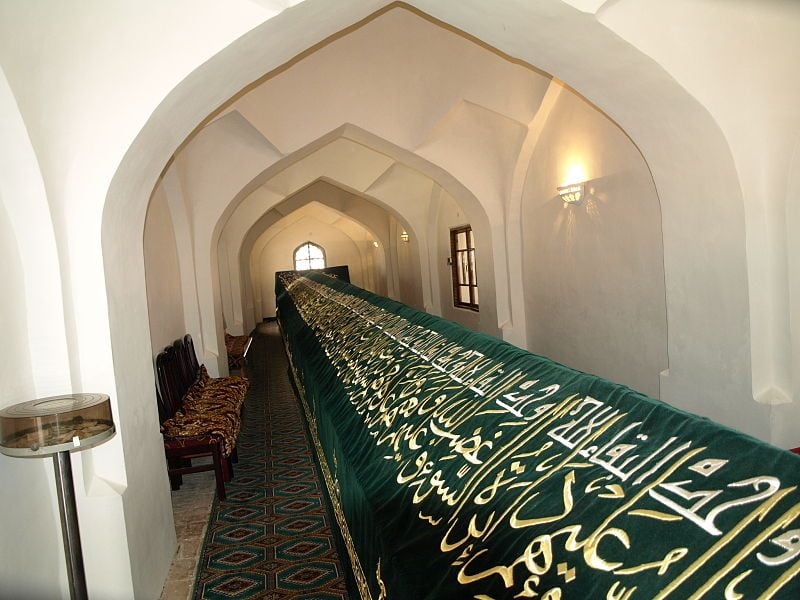
The Samarkand Jewish Food Festival
The Samarkand Jewish Food Festival is an annual celebration of the city’s rich and vibrant Jewish culture, where visitors can sample a variety of delicious dishes that have been prepared according to traditional recipes. Held in the heart of the city’s Jewish Quarter, this popular event draws people from far and wide who come to savor a range of authentic cuisine. From succulent meats cooked over open fires to sweet treats made with honey and almonds, there is something for everyone at this mouth-watering festival! Visitors can also enjoy live music performances while they eat, making it a truly unique experience. Whether you’re looking for a taste of history or just want some delicious food, the Samarkand Jewish Food Festival has it all!
Iconic Personalities of Samarkand
Alexander Sverdlin
Alexander Sverdlin was a Jewish scholar and rabbi who lived in Samarkand during the 18th century. He is best known for his contributions to Jewish thought and culture, which helped shape the city into what it is today. As one of the most influential figures in Samarkand’s history, Sverdlin wrote extensively on topics such as Talmud and Torah studies, religious law, philosophy, ethics, and literature. His works were widely read throughout Europe at the time and laid the foundations for modern Judaism around the world. He also founded a school in Samarkand that taught students from all backgrounds about Jewish faith, culture, and tradition – an institution that continues to thrive centuries later. To this day Alexander Sverdlin remains an important figure in Samarkand’s vibrant Jewish community; his legacy lives on through those who continue to practice their faith there.
Shimon Dubnov
Shimon Dubnov is an important figure in the history of Samarkand’s Jewish community. He was born into a prominent family in the city and went on to become a renowned scholar, author, historian, and philosopher. Dubnov wrote extensively about Jewish culture and tradition, particularly focusing on the Silk Road area where he spent much of his life. His works helped shape modern Judaism around the world by introducing new ideas about religion, ethics, philosophy, and literature. Dubnov also founded several schools in Samarkand that taught students from all backgrounds about their faith – institutions that still exist today! Shimon Dubnov was instrumental in preserving Jewish heritage during difficult times for Jews around the world; he remains an integral part of Samarkand’s vibrant past and present.
Summary of Samarkand’s Jewish Story
Samarkand is home to a vibrant and long-standing Jewish community that has helped shape the city’s culture for centuries. From the Tomb of Daniel, an important pilgrimage site for Jews around the world, to the annual Samarkand Jewish Food Festival where visitors can sample traditional cuisine, there are plenty of opportunities to experience something truly special while visiting this historic city. Notable figures like Alexander Sverdlin and Shimon Dubnov have also left their mark on Samarkand’s history; they remain integral parts of its present-day identity as well. Whether you’re interested in learning more about Judaism or just want to explore some fascinating places with unique cultures, Samarkand should be at the top of your list!

